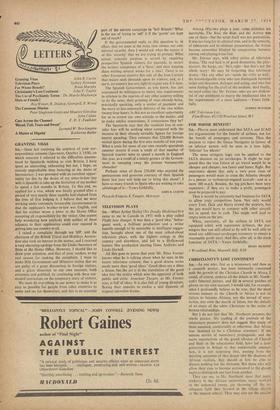SIR,—Pharos must understand that IATA and ICAO are organisations for
the benefit of airlines, not for the benefit of passengers and aircrews. Thus the decision to reject the Decca Navigator in favour of an inferior system will be • seen in a new light. 'Inferior' for whom?
The same stringent logic can be applied to the IATA decision on jet surcharges. It might be sup- posed that the true future of air travel would lie in cheaper and cheaper, not faster and faster, flight. But experience shows that only a very poor class of passengers would want to cross the Atlantic cheaply in a piston- or turboprop-engined aircraft—and at a mere 300 m.p.h. Besides, the big jets have been very expensive: if they are to make a profit, passengers must be prepared to pay.
Thus it would be extremely bad business for IATA to. allow truly competitive fares. Not only would every Tom, Dick and Harry crowd the airports, but the jets would have to compete with other aircraft not in speed, but in cash. This might well lead to empty seats on the jets.
When, inevitably, all the airlines in IATA are equipped solely with supersonic airliners, the pas- sengers that can still afford to fly will be well able to stand any additional surcharges necessary to ensure a reasonable profit level. And this, after all, is the main function of IATA.—Yours faithfully,






































 Previous page
Previous page